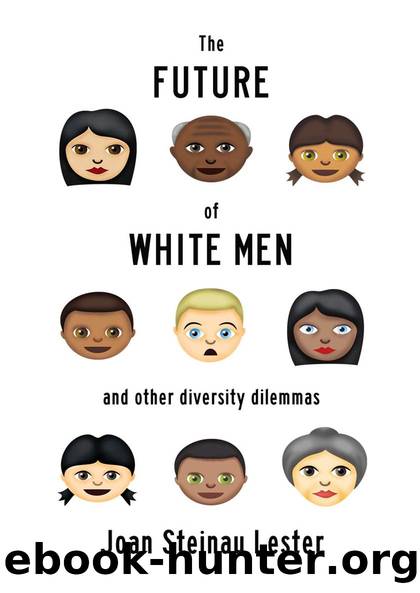The Future of White Men and Other Diversity Dilemmas by Joan Steinau Lester

Author:Joan Steinau Lester [Lester, Joan Steinau]
Language: eng
Format: epub
Tags: Social Science, General, Ethnic Studies, Discrimination
ISBN: 9781504032292
Google: c722CwAAQBAJ
Publisher: Open Road Media
Published: 2016-03-22T05:46:51+00:00
Whatâs in a Name?
The group with most social power generally also has the ability to name things and people. So part of the movement toward self-pride and empowerment of an excluded group is to begin to name itself: women, not girls; Asian-American, not Oriental.
Because this naming signifies a greater power struggle, it is often highly charged.
Fifteen years ago I heard a popular talk-show host give a speech to a large auditorium full of people. At one point during his talk he mentioned girls, meaning women.
âWomen,â someone yelled out.
âIâm used to saying girls. The name doesnât really matter,â he laughed and went on.
It mattered to many women there, who began to shout, âWomen!â
There was tremendous force behind the shouting. This really mattered.
African-American women and men have battled the demeaning labels girl and boy for several hundred years.
To an outsider, the discussion about a group name can be confusing, especially because it seems to change rapidly and we donât know why.
âColored, Negro, Black, Afro-American, African-American, Third World people, First World people, people of color. How am I supposed to keep up? And why bother?â
We can keep up by noticing what terms are being used most frequently by people and media we respect, by asking about it, and by following the discussion. There is always a public discussion about a peoplesâ changing self-perception. The new name simply reflects that.
And if we plan to succeed in diverse settings we need to keep up, to give respect to others, calling them by the name they prefer.
It may be that an older name becomes somewhat contaminated by oppressive conditions. A new name can enter the scene untarnished, signifying a new generationâs hope for a brighter group future. As such it deserves to be respected.
The changing context often means that there is some generational tension as the language is changing. An older generation that fought hard to maintain dignity in the face of words hurled as epithetsâqueer or black, for instanceâsometimes has difficulty proudly claiming such a word. For a while we may inwardly cringe, even as we applaud the boldness of our younger peers.
âHispanic, Latino/Latina, Latino-Chicano/Chicana, Chicano/Chicana, Mexican-American?â
A woman in a seminar said that her grandmother told her when she was young that Spanish used to be the prized term for Latinos/Latinas. It was good because it highlighted the European heritage while not acknowledging the other heritages. Now that there is more pride in the multiple heritage of Latin culturesâthe native Indian and African heritages as well as the Spanishâthe name Latino/Latina is often preferred, which includes, for some, all of those historic cultures. U.S. Latinos/Latinas frequently use that term. Yet for Latinos/Latinas in their country of origin, or for those who are first generation, specificity of countryâlike Mexico, Brazil, or El Salvadorâis crucial. That is their identity. So the term Latino/Latina is very much a U.S. term, implying a commonality of culture.
Every ethnic group has its own dilemmas. For example: âYou say Asian when you mean Asian-American. Iâm not Asian, my people have been here for three generations.
Download
This site does not store any files on its server. We only index and link to content provided by other sites. Please contact the content providers to delete copyright contents if any and email us, we'll remove relevant links or contents immediately.
Cecilia; Or, Memoirs of an Heiress — Volume 1 by Fanny Burney(31366)
Cecilia; Or, Memoirs of an Heiress — Volume 3 by Fanny Burney(30962)
Cecilia; Or, Memoirs of an Heiress — Volume 2 by Fanny Burney(30918)
The Great Music City by Andrea Baker(22083)
We're Going to Need More Wine by Gabrielle Union(18100)
Bombshells: Glamour Girls of a Lifetime by Sullivan Steve(13132)
Pimp by Iceberg Slim(12965)
All the Missing Girls by Megan Miranda(12798)
Fifty Shades Freed by E L James(12474)
Talking to Strangers by Malcolm Gladwell(11935)
Norse Mythology by Gaiman Neil(11932)
Crazy Rich Asians by Kevin Kwan(8386)
Mindhunter: Inside the FBI's Elite Serial Crime Unit by John E. Douglas & Mark Olshaker(7870)
The Lost Art of Listening by Michael P. Nichols(6502)
Enlightenment Now: The Case for Reason, Science, Humanism, and Progress by Steven Pinker(6430)
Bad Blood by John Carreyrou(5798)
The Four Agreements by Don Miguel Ruiz(5547)
Weapons of Math Destruction by Cathy O'Neil(5068)
We Need to Talk by Celeste Headlee(4898)
